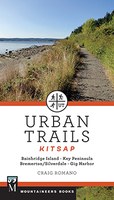
It was an absolutely breathtaking Northwest late fall afternoon. I was doing field research (translation=hiking) for my upcoming Urban Trails Eastside Mountaineers Books guidebook. My task was to check out a patch of urban greenery on Lake Washington’s eastern shore. As I walked down this park’s trails and across its boardwalks, I was mesmerized by the surrounding natural beauty and by the moment itself. The sun was low, the sky deep blue. Rays of sunlight kissed my face and danced across the shimmering waters of a quiet bay. They illuminated the resident waterfowl and intensified the brilliant colors of the autumn foliage. The sun continued to sink in the sky and my surroundings became more surrealistic. I was in pure hiking heaven — utterly elated — senses completely stimulated.
There were scores of other folks out on the trail too. Folks of all ages, ethnicities, and socio-economic backgrounds. Some were sauntering. Some were sitting. But the light that was radiating on golden leaves and silvery ripples seemed to have ill effect on my fellow park visitors. A cold chill soon embraced me. I wasn’t on a beautiful undeveloped lakeshore in suburban Seattle any longer. I was in the fictitious town of Santa Mira, California — ground zero in the 1950s movie Invasion of the Body Snatchers. This community had become full of Pod People (a term coined from the classic 1970s remake of said film) — folks devoid of human emotion because they had slowly and insipidly been taken over by alien body snatchers.
But the Pod People who surrounded me weren’t invaded by body snatchers from outer space. No, their humanity and emotions had been robbed by smart phones! Every single person walking past me, toward me, and slackened to a trailside bench that afternoon was plugged into a screen. No nods of hello. No eyes admiring the beautiful setting sun. No facial validations of contentment, bliss, or astonishment of the natural beauty beneath their noses. Nope — their heads were cocked downward. Some blankly blathered into the air; others frantically twitched their thumbs; and some sat or walked in groups, projecting stony stares with no acknowledgment that they were with others.
I wanted to scream! They had all been robbed of their bodies by some insidious force. Their electronic gadgets had stolen their humanity. As the evening sky extinguished the sun — the horizon turning a fiery red, nary a Pod Person batted an eye upward. Wired to their life-support systems, they displayed no emotion. In an electronic-induced trance they weren’t living for the moment. Nature and all of her redemptive qualities couldn’t disrupt the strength and pull of the almighty WiFi that evening.
I work on a computer and cherish the technology that has made my job as a writer so much easier and more productive than in the good old days. I am not a modern-day Luddite, someone who eschews or wishes to destroy new technology, in this case, computers and mobile devices, in order to retain a simpler lifestyle. I am, however, on a self-prescribed tech diet.
I cherish hiking, running, and being outdoors for their simple and redeeming qualities. No gadgets or screens needed. I don’t need to track every hike. I don’t need to check emails and text friends while I’m out in the woods. I don’t need to share a picture of myself, straining a smile or in an awkward yoga pose, standing in front of some landmark, with 100s of followers, many (perhaps most) whom I’ve never even met. No, I head to the woods to escape technology and the ever-present clutter of the modern world. I go for a run to turn my mind inward; to focus on my breathing and the world around me and feel alive. No electronic gadget can do that for me. Handheld electronics are like narcotics. They have great applications but are all too often abused leading to addiction and a state in which our mental, physical, and spiritual selves suffer.
Film critics have analyzed Invasion of the Body Snatchers and have found several themes: some point to the movie as an allegory for the loss of personal autonomy under the McCarthy communist scare and under Communism itself. Others see the movie representing the conformity of the Eisenhower years. I see it as a brilliant foretelling of the modern age, alarming us to the grip personal mobile devices have on their users. Users, not owners, for the owners are the gadgets.
The rise of the 1960s counter-culture was in no small part a reaction to the conformity and vacuous consumption of the 1950s. Will we usher in a second dawn of Aquarius to correct the technological imbalance of the present day? In the 1960s psychologist and counter-culture icon Timothy Leary told the world to, “Turn on, tune, in and drop out.” In essence, he was encouraging people to detach themselves from existing conventions and hierarchies.
Leary elaborated that “turn on” meant to become in touch with the levels of consciousness around you. “Tune in” meant to interact harmoniously with the world around you. And “drop out” meant to detach yourself from involuntary or unconscious commitments — in essence striving toward self-reliance and discovery. You can’t do any of that while passively engaging with an electronic device while the world around you passes you by. And while Leary advocated the use of psychedelic drugs to attain this, I substitute nature — getting outside, walking, hiking, and running — as the means to turn on, tune in, and drop out.
The 1960s also gave us the Marvel Universe. It was when a young Peter Parker, upon becoming Spider-Man, learns that “with great power comes great responsibility.” Just because we can, must we? Restraining ourselves requires more strength than showing a use of force. Do we really need all of this technology in our lives? Does it all really enhance our lives or does it further complicate and clutter it? How does it improve something as simple as the act of hiking? Or improve our relationships with the outdoor world — or our relationships with each other?
Thoreau and Muir were concerned about the transformation of their times’ impact on the natural world around them during the industrial revolution. I still share that concern but am equally alarmed on how the proliferation of today’s technology is robbing us of our humanness. No app will improve the sunset or allow you to feel the intensity of the wilderness on your body and soul. Let God be your witness to your beautiful surroundings, not 1,000 Instagram followers. No GPS device makes your hike longer, shorter, harder, or easier. The trail just is. Walk it. Feel it. Cherish it. Reflect upon it. Let it forever be stored in the hard drive known as your brain.
I can very well purchase and use all of the latest electronic gadgets and load them with apps galore if I wish. I don’t. I see very little value in most of it. It doesn’t simplify my life. It complicates it. None of it will enhance my hikes, my time in nature, my relationships with others, and my relationship with my creator and the beautiful world around me. My mantra —Turn off, tune out, drop in. Turn off the distracting clutter of electronic gadgets. Tune out the electronic noise and focus on the world and people around you. And drop into a whole new sense of consciousness — one that heightens your existence as a human being and your interconnectedness with the natural world around you. It’s easy to do — just put one step in front of the other unencumbered by electronic distractions and let the discoveries begin. You’ll also be helping vanquish the outdoor world of the body snatchers.
Craig is an award-winning Mountaineers Books author who has written and co-written 20 books. His latest release, Urban Trails Olympia highlights the best trails for walking, running and hiking in Olympia, Shelton, Harstine Island, and Capitol State Forest. Some of his other titles include 100 Classic Hikes Washington, Backpacking Washington, and Day Hiking Olympic Peninsula (2nd edition).
 Craig Romano
Craig Romano


